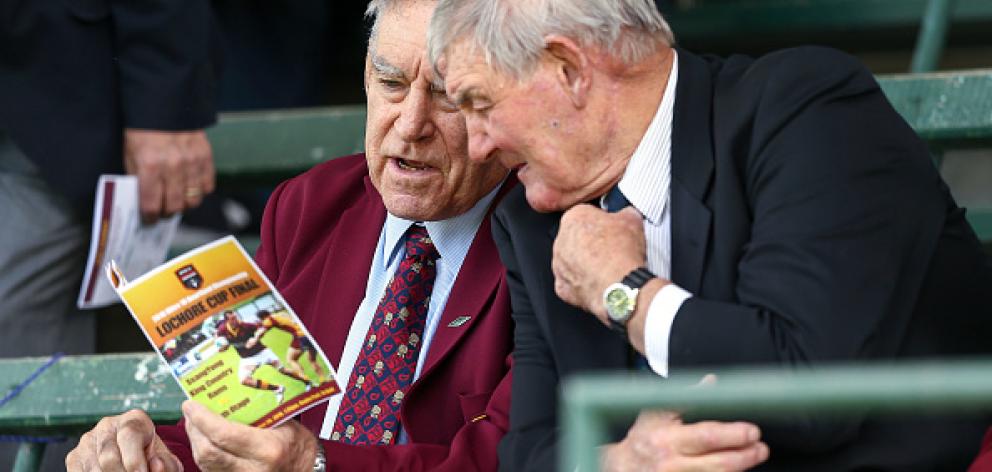
The 78-year-old, who played 25 tests (68 matches) for New Zealand at No 8 and lock from 1964 to 1971, died on Saturday after a battle with bowel cancer.
Lochore's wife, Lady Pam and the couple's three children said they were mourning, but relieved his suffering had ended. They wanted to express their gratitude for the care and support the family has received since Lochore's diagnosis.
Eldest son David Lochore said: "We would like to note a special thanks to all the Doctors that have tried so hard and the exceptional care the palliative nurses have shown to our Dad.
"To those from around New Zealand and the world who have sent messages, these have been enjoyed by our Dad and appreciated by us all.
"Our heartfelt gratitude to family and friends who have provided support to us during this time, we thank you for your kindness.
"Dad led a life that was full and one which he was very proud of. Our hearts are breaking at a life we feel still had much to give."
Lochore is survived by Pam, their children David, Joanne and Sandra, and their eight grandchildren.
Details of the funeral service will be made available once they have been finalised.
In June, Rugby Union chief executive Steve Tew announced he had been diagnosed with bowel cancer.

Members of New Zealand's sporting community have paid tribute.
Hamish McKay wrote on Facebook: "Another legend has left us. Sir Brian Lochore R.I.P. A gentleman who had time for everyone. Great leader, player, coach. #rugby #legendtweeted."
In 1999 he became the second All Black to be knighted, bestowed with the Queen's birthday honour a year after Wilson Whineray. The same year he was inducted into the International Rugby Hall of Fame, while in 2006 the Lochore Cup was named after him, presented to the second-tier winner of New Zealand's Heartland Championship competition.
Born in Masterton on September 3, 1940, Lochore was synonymous with the Wairarapa. He made his debut for Wairarapa in 1959 and played all his provincial rugby for the small union.
That year he was included in a combined Wairarapa-Bush team (the two unions did not formally merge until 1971) to face a Lions team that included the likes of Tony O'Reilly and Peter Jackson.
The Wairarapa Times-Age lauded his performance, describing him as "outstanding, whether tackling, pursuing the loose ball or lending support in tight play".
His All Blacks test debut came at No 8 in January 1964 against England in London. Lochore was credited with bringing a new dynamic to the role of No 8 - with his corner-flagging, aerial work and unstinting physical onslaught.
His leadership qualities were quickly identified. He was named captain of the All Blacks in 1966 and held the role until his retirement in 1970. Lochore led the 1967 All Blacks to an unbeaten tour of Britain, France and Canada with test wins over England, Wales, France and Scotland.
That team, containing legendary names like colin Meads, Kel Tremain, Waka Nathan, Ken Gray and Fergie McCormick, is regarded as one of the great sides in All Black history and would have surely become the first All Black side to win the coveted Grand Slam were it not for an outbreak of foot-and-mouth disease that prevented them travelling to Ireland.
At age 30 he famously returned for one test in 1971 against the British Lions to help out an injury-struck side. As legend has it, he packed a bag and jumped into his Land rover to catch the 2pm Masterton-Wellington train, having time only to write the following note to wife Pam: "Gone to Wellington, playing test tomorrow. Will ring you later."
The match went badly, but Lochore's economy with words became famous in the aftermath.
He remained a towering figure in rugby after his playing days giving more than 50 years of service to New Zealand Rugby.
He later coached Wairarapa Bush to first division status and was the All Blacks coach from 1985 to 1987, winning the inaugural Rugby World Cup. He was also All Blacks campaign manager at the 1995 World Cup and selector for the 2007 World Cup.
The 1987 side was full to overflowing with talent and Lochore won plaudits for providing them the framework to express their skills. Behind the gruff exterior, he was a progressive in regards to fostering player-led environments.
"His wisdom and mentorship has been huge for the coaches and players," coach Sir Graham Henry said of Lochore in 2007, "and we are very grateful to Sir Brian. He represents a lot of the All Blacks values and tradition and we wish we could have delivered a World Cup to finish his time with the team."
The late Sir Colin Meads wrote in his biography that Lochore was everything we wanted in a No 8.
"He spared himself, not an ounce working away in the tight-loose, covering, winning us great lineout ball in the deep, backing and filling and playing his part in the rolling drive-and-feed. As a captain he could be self-effacing, for this was the very nature of the man."
Statistics
Date of birth: 3 September 1940
Position: Number 8
Matches: 68
Tests: 25
Test debut: 4 January 1964 v England, London
Last test: 31 July 1971 v British & Irish Lions, Wellington
Province: Wairarapa
Test tries: 2
Test points: 6

